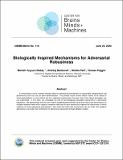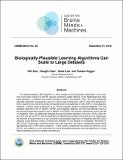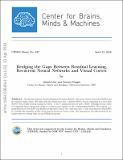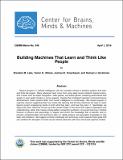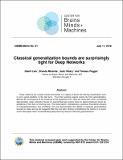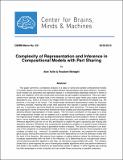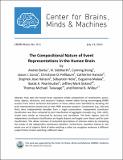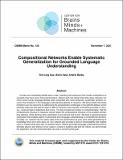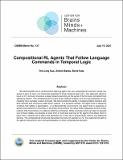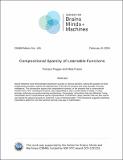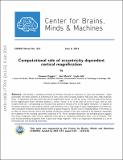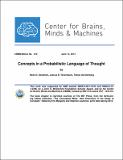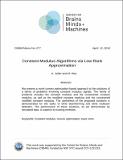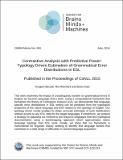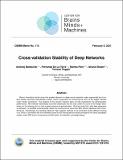Browsing Center for Brains, Minds & Machines by Title
Now showing items 6-25 of 151
-
Biologically Inspired Mechanisms for Adversarial Robustness
(Center for Brains, Minds and Machines (CBMM), 2020-06-23)A convolutional neural network strongly robust to adversarial perturbations at reasonable computational and performance cost has not yet been demonstrated. The primate visual ventral stream seems to be robust to small ... -
Biologically-Plausible Learning Algorithms Can Scale to Large Datasets
(Center for Brains, Minds and Machines (CBMM), 2018-09-27)The backpropagation (BP) algorithm is often thought to be biologically implausible in the brain. One of the main reasons is that BP requires symmetric weight matrices in the feedforward and feed- back pathways. To address ... -
Biologically-plausible learning algorithms can scale to large datasets
(Center for Brains, Minds and Machines (CBMM), arXiv.org, 2018-11-08)The backpropagation (BP) algorithm is often thought to be biologically implausible in the brain. One of the main reasons is that BP requires symmetric weight matrices in the feedforward and feedback pathways. To address ... -
Brain Signals Localization by Alternating Projections
(Center for Brains, Minds and Machines (CBMM), arXiv, 2019-08-29)We present a novel solution to the problem of localization of brain signals. The solution is sequential and iterative, and is based on minimizing the least-squares (LS) criterion by the alternating projection (AP) algorithm, ... -
Bridging the Gaps Between Residual Learning, Recurrent Neural Networks and Visual Cortex
(Center for Brains, Minds and Machines (CBMM), arXiv, 2016-04-12)We discuss relations between Residual Networks (ResNet), Recurrent Neural Networks (RNNs) and the primate visual cortex. We begin with the observation that a shallow RNN is exactly equivalent to a very deep ResNet with ... -
Building machines that learn and think like people
(Center for Brains, Minds and Machines (CBMM), arXiv, 2016-04-01)Recent progress in artificial intelligence (AI) has renewed interest in building systems that learn and think like people. Many advances have come from using deep neural networks trained end-to-end in tasks such as object ... -
Can a biologically-plausible hierarchy e ectively replace face detection, alignment, and recognition pipelines?
(Center for Brains, Minds and Machines (CBMM), arXiv, 2014-03-27)The standard approach to unconstrained face recognition in natural photographs is via a detection, alignment, recognition pipeline. While that approach has achieved impressive results, there are several reasons to be ... -
Can we Contain Covid-19 without Locking-down the Economy?
(Center for Brains, Minds and Machines (CBMM), 2020-03-26)We present an analysis of a risk-based selective quarantine model where the population is divided into low and high-risk groups. The high-risk group is quarantined until the low-risk group achieves herd-immunity. We tackle ... -
Classical generalization bounds are surprisingly tight for Deep Networks
(Center for Brains, Minds and Machines (CBMM), 2018-07-11)Deep networks are usually trained and tested in a regime in which the training classification error is not a good predictor of the test error. Thus the consensus has been that generalization, defined as convergence of the ... -
Complexity of Representation and Inference in Compositional Models with Part Sharing
(Center for Brains, Minds and Machines (CBMM), arXiv, 2015-05-05)This paper performs a complexity analysis of a class of serial and parallel compositional models of multiple objects and shows that they enable efficient representation and rapid inference. Compositional models are generative ... -
The Compositional Nature of Event Representations in the Human Brain
(Center for Brains, Minds and Machines (CBMM), arXiv, 2014-07-14)How does the human brain represent simple compositions of constituents: actors, verbs, objects, directions, and locations? Subjects viewed videos during neuroimaging (fMRI) sessions from which sentential descriptions of ... -
Compositional Networks Enable Systematic Generalization for Grounded Language Understanding
(Center for Brains, Minds and Machines (CBMM), Conference on Empirical Methods in Natural Language Processing (EMNLP), 2021-11-07)Humans are remarkably flexible when under- standing new sentences that include combinations of concepts they have never encountered before. Recent work has shown that while deep networks can mimic some human language ... -
Compositional RL Agents That Follow Language Commands in Temporal Logic
(Center for Brains, Minds and Machines (CBMM), Frontiers in Robotics and AI, 2021-07-19)We demonstrate how a reinforcement learning agent can use compositional recurrent neural net- works to learn to carry out commands specified in linear temporal logic (LTL). Our approach takes as input an LTL formula, ... -
Compositional Sparsity of Learnable Functions
(Center for Brains, Minds and Machines (CBMM), 2024-02-08)Neural networks have demonstrated impressive success in various domains, raising the question of what fundamental principles underlie the effectiveness of the best AI systems and quite possibly of human intelligence. This ... -
Compositional Sparsity: a framework for ML
(Center for Brains, Minds and Machines (CBMM), 2022-10-10)The main claim of this perspective is that compositional sparsity of the target function, which corre- sponds to the task to be learned, is the key principle underlying machine learning. I prove that under restrictions of ... -
Computational role of eccentricity dependent cortical magnification
(Center for Brains, Minds and Machines (CBMM), arXiv, 2014-06-06)We develop a sampling extension of M-theory focused on invariance to scale and translation. Quite surprisingly, the theory predicts an architecture of early vision with increasing receptive field sizes and a high resolution ... -
Concepts in a Probabilistic Language of Thought
(Center for Brains, Minds and Machines (CBMM), 2014-06-14)Knowledge organizes our understanding of the world, determining what we expect given what we have already seen. Our predictive representations have two key properties: they are productive, and they are graded. Productive ... -
Constant Modulus Algorithms via Low-Rank Approximation
(Center for Brains, Minds and Machines (CBMM), 2018-04-12)We present a novel convex-optimization-based approach to the solutions of a family of problems involving constant modulus signals. The family of problems includes the constant modulus and the constrained constant modulus, ... -
Contrastive Analysis with Predictive Power: Typology Driven Estimation of Grammatical Error Distributions in ESL
(Center for Brains, Minds and Machines (CBMM), arXiv, 2016-06-05)This work examines the impact of crosslinguistic transfer on grammatical errors in English as Second Language (ESL) texts. Using a computational framework that formalizes the theory of Contrastive Analysis (CA), we demonstrate ... -
Cross-validation Stability of Deep Networks
(Center for Brains, Minds and Machines (CBMM), 2021-02-09)Recent theoretical results show that gradient descent on deep neural networks under exponential loss functions locally maximizes classification margin, which is equivalent to minimizing the norm of the weight matrices under ...

